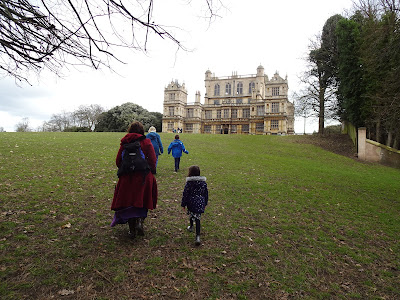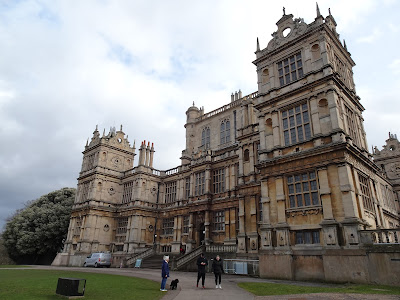Wollaton Hall is the atmospheric context of a very interesting
natural history display. I can recommend a visit.
After my last post on the homely Elizabethan Trerice House in Cornwall I thought I'd post on the very contrasting stately home, Wollaton Hall, which is also Elizabethan, but by intention far from homely. It classifies as a "prodigy house", that is house which self-consciously wallows in its very contrived grandeur. Blickling Hall, where I worked for three very pleasant years, classified as a prodigy house. (See also Hatfield House, by the same architect). Stately homes in this category are intended to be awe inspiring rather than homely. If the sense of awe they generate comes at the price of mixing in a little fear and intimidation then so be it: The owners of these houses wanted their high status to be all too apparent regardless of any accompanying sense of discomfort these houses engender; if anything, a little fear enhances the feeling of awe & respect; ask any dictator.
Wollaton Hall can be reached by a climbing the rise on which it is situated. As no doubt intended its profile dominates the surrounding landscape (see above). As one closes in on it the rich ornamentation of its facade becomes very striking: If that ornamentation looks ostentatious to the viewer, then it has probably achieved its purpose of manipulating the feelings of the visitor: The Hall shouts wealth and status at the expense of any negative feelings one might have about the mood it conveys. It is not built to primarily make friends with the viewer, but at all costs to impress even if that evokes a sense of being over-awed. Rich and powerful people tread a very a precarious path that runs temptingly close to assuming demigod status.
Just inside the entrance of the palace is a very lofty hall of equal grandeur: Its elaborate ceiling bosses are surrounded by grotesques which peer down at the visitor giving the first inkling that this could be a spooky place; in fact, the Hall makes claim to being the haunt of several ghosts.
The Hall is now a natural history museum, and it is atmospheric enough to serve well as the setting for one of those "A night in the museum" thrillers, where fearful exhibits start to stir in the darkness!
It was very appropriate then that we came on the day that a special exhibition had been laid on: In fact, we had come to the Hall to see this monster......
T-Rex lunges at his next victim!
... the real bones of a gigantic T-Rex. More than 65 million years ago these now fossilized bones were running around terrorizing the population of lesser dinosaurs. For a T-Rex to grow to these dimensions it must have cost the lives of many other dinosaurs; how many dinosaur hides had those wicked looking teeth sunk themselves into? Like the original owners of Wollaton Hall he was at the top of his game; he was not called "Rex" for nothing!
It was easy to imagine T-Rex roaming the corridors and large rooms of Wollaton Hall (although doorways would pose a problem!). In terms of size human constructions have far exceeded dinosaurian scales and yet in comparison even these scales pale on the cosmic stage. Moreover, the immense tracts of cosmic time make the 165-million-year reign of "the grotesque saurians, the huge brutes of Jurassic times"* look to be very ephemeral. The apparently pointless long reign of saurian survival hangs over any curious theist as an enigma.
Like Wollaton Hall the cosmos is an awesome, spooky, even a frightening place, intimidating in its size & detail and yet paradoxically beautiful at the same time. It is no wonder the general populace are having trouble making anthropic sense of it all Ways of cutting the gordian knot quickly are sought for: Some throw their hands up in disbelief, resorting to explanations of sheer chance and believe the cosmos has no anthropic significance. Cranky Christian popularist sects, unable to come to terms with cosmic dimensions, have cosified it with those incredible shrinking doctrines of young earthism (and even flat earthism) and sought assurance, security and above all certainty by running after authoritarian, presumptuous, delusional and even corrupt leaders who tell them what they want to hear.
As for me I find I can't be too hard on either atheist or the average cranky cult Christian: Both are understandable intellectual short-cuts given the tricky questions that are part of the human predicament; these are reactions which in my view are completely undeserving of the traditional hell. So, it's over to you God; it's your problem not mine.
Footnote:
*The Time Machine, The Epilogue, by H G Wells.
Relevant Link:





No comments:
Post a Comment